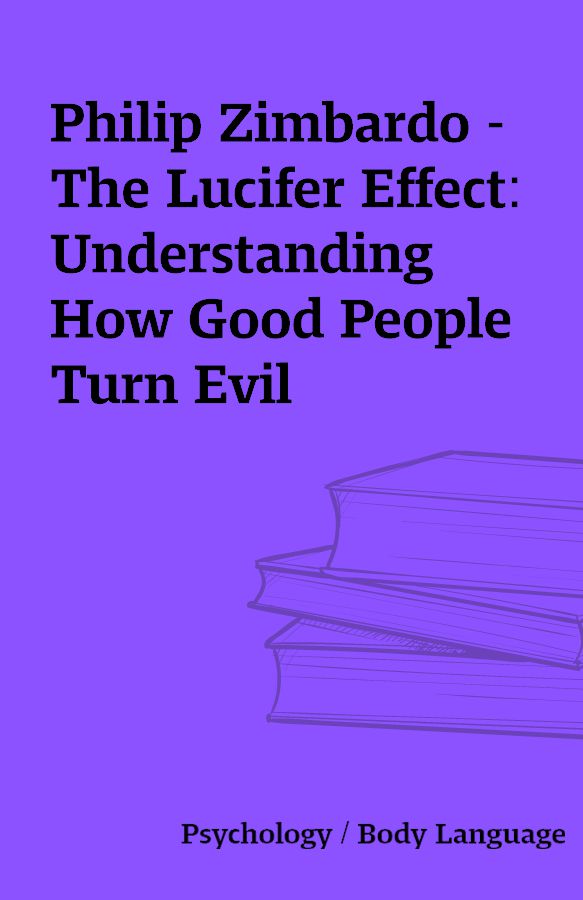Philip Zimbardo – The Lucifer Effect: Understanding How Good People Turn Evil
Philip Zimbardo – The Lucifer Effect – Understanding How Good People Turn Evil
[UN (38 MP3s)]
Description
What makes good people do bad things? How can moral people be seduced to act immorally? Where is the line separating good from evil, and who is in danger of crossing it? Renowned social psychologist Philip Zimbardo has the answers, and in The Lucifer Effect he explains how-and the myriad reasons why-we are all susceptible to the lure of “the dark side.” Drawing on examples from history as well as his own trailblazing research, Zimbardo details how situational forces and group dynamics can work in concert to make monsters out of decent men and women. Zimbardo is perhaps best known as the creator of the Stanford Prison Experiment. Here, for the first time and in detail, he tells the full story of this landmark study, in which a group of college-student volunteers was randomly divided into guards and inmates and then placed in a mock prison environment. Within a week the study was abandoned, as ordinary college students were transformed into either brutal, sadistic guards or emotionally broken prisoners.By illuminating the psychological causes behind such disturbing metamorphoses, Zimbardo enables us to better understand a variety of harrowing phenomena, from corporate malfeasance to organized genocide to how once upstanding American soldiers came to abuse and torture Iraqi detainees in Abu Ghraib. He replaces the long-held notion of the “bad apple” with the “bad barrel”-the idea that the social setting and the system contaminate the individual, rather than the other way around.This is a book that dares to hold a mirror up to mankind, showing us that we might not be who we think we are. While forcing us to reexamine what we are capable of doing when caught up in the crucible of behavioral dynamics, though, Zimbardo also offers hope. We are capable of resisting evil, he argues, and can even teach ourselves to act heroically. Like Hannah Arendt’s Eichmann in Jerusalem and Steven Pinker’s The Blank Slate, The Lucifer Effect is a shocking, engrossing study that will change the way we view human behavior.From Publishers WeeklyPsychologist Zimbardo masterminded the famous Stanford Prison Experiment, in which college students randomly assigned to be guards or inmates found themselves enacting sadistic abuse or abject submissiveness. In this penetrating investigation, he revisits—at great length and with much hand-wringing—the SPE study and applies it to historical examples of injustice and atrocity, especially the Abu Ghraib outrages by the U.S. military. His troubling finding is that almost anyone, given the right “situational” influences, can be made to abandon moral scruples and cooperate in violence and oppression. (He tacks on a feel-good chapter about “the banality of heroism,” with tips on how to resist malign situational pressures.) The author, who was an expert defense witness at the court-martial of an Abu Ghraib guard, argues against focusing on the dispositions of perpetrators of abuse; he insists that we blame the situation and the “system” that constructed it, and mounts an extended indictment of the architects of the Abu Ghraib system, including President Bush. Combining a dense but readable and often engrossing exposition of social psychology research with an impassioned moral seriousness, Zimbardo challenges readers to look beyond glib denunciations of evil-doers and ponder our collective responsibility for the world’s ills.From BooklistSocial psychologist Zimbardo is best known as the father of the 1971 Stanford Prison Experiment, which used a simulated prison populated with student volunteers to illustrate the extent to which identity is situated within a social setting; student volunteers randomly chosen to play guards became cruel and authoritarian, while those playing inmates became rebellious and depressed. With this book, Zimbardo couples a thorough narrative of the Stanford Prison Experiment with an analysis of the social dynamics of the Abu Ghraib prison in Iraq, arguing that the “experimental dehumanization” of the former is instructive in understanding the abusive conduct of guards at the latter. This comparison, which is the book’s core insight, is embedded in a sprawling discussion about situational influences that cobbles together a discussion of the psychology of evil, a strong criticism of the Bush administration, and a chapter celebrating heroism and calling for greater social bravery. The following is representative of all of the files in the folder.GeneralComplete name : Philip Zimbardo – The Lucifer Effect – Understanding How Good People Turn Evil�1. Foreword.mp3Format : MPEG AudioFile size : 2.73 MiBDuration : 6mn 48sOverall bit rate mode : ConstantOverall bit rate : 56.0 KbpsWriting library : LAME3.93AudioFormat : MPEG AudioFormat version : Version 2Format profile : Layer 3Duration : 6mn 50sBit rate mode : ConstantBit rate : 56.0 KbpsChannel(s) : 2 channelsSampling rate : 22.05 KHzCompression mode : LossyStream size : 2.73 MiB (100%)Writing library : LAME3.93Publisher: Tantor Audio; MP3 – Unabridged CD edition (March 31, 2011)Language: EnglishISBN-10: 1452651507ISBN-13: 978-1452651507
You must be logged in to post a review.






Reviews
There are no reviews yet.